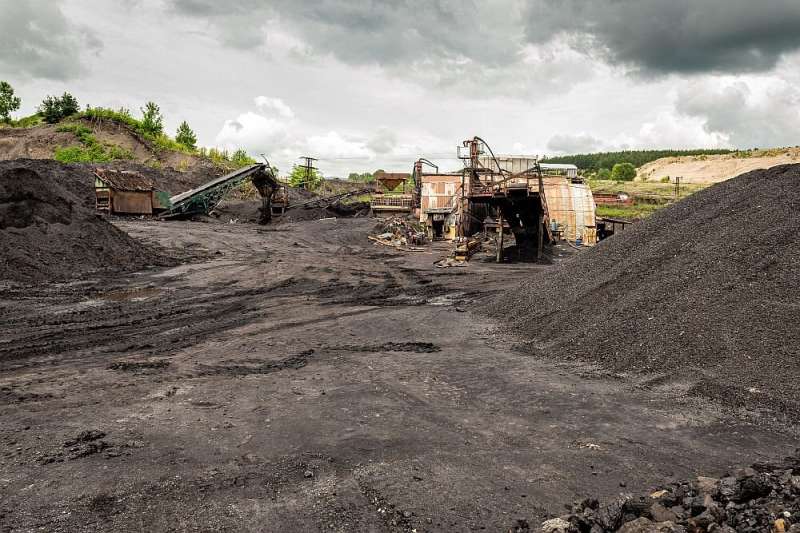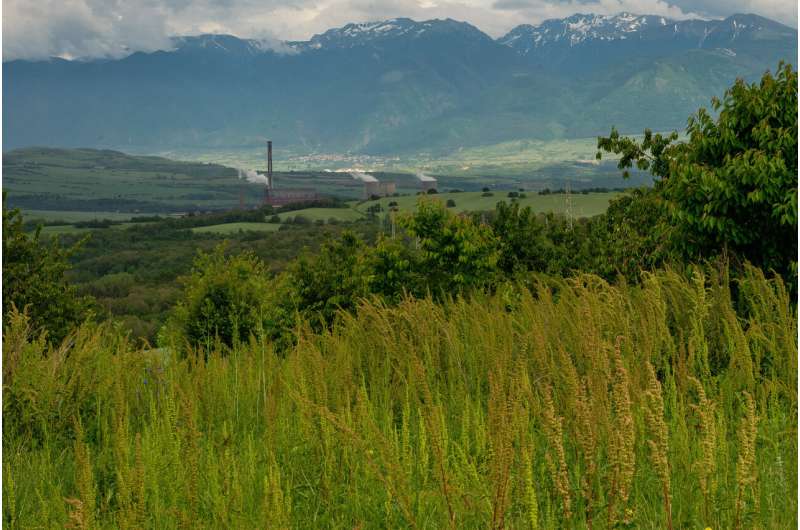Bela Voda Open Mine, Bulgaria. Territorial Just Transition Plans must be underpinned by higher ambition and timelines for fossil fuel phase out. Credit: WWF-Bulgaria
The path to a climate neutral Europe became a little easier today, with the European Commission's proposal for a fund to help coal regions reach climate neutrality. The Just Transition Mechanism aims to mobilise up to €100 billion to support workers and their communities to develop sustainable economic activities in regions whose economies are based on carbon-intensive activities, like coal mining. The mechanism requires regional just transition plans to be compatible with EU climate and energy goals. This means EU Member States have no excuse not to sign up for climate neutrality. However, the mechanism is not clear enough on the need for regional plans to include timelines for the phase out of fossil fuels, including a phase-out date for coal of 2030 or earlier. This should be clearly stated in the 2030 National Climate and Energy Plans or 2050 Long-Term National Decarbonisation Strategies. MEPs and EU Member States must step-up its ambition to deliver a truly just transition.
Katie Treadwell, energy policy officer at WWF European Policy Office, says, "A climate neutral Europe needs everyone to play their part. The proposed just transition mechanism is an important step towards making that happen. But a 'just transition' is not 'just' if regions are locked into unviable fossil fuels. It is not a 'transition' if there is no deadline for getting climate neutral. MEPs and EU Member States must improve the proposal so that regions show how and by when they will get free from gas, oil and coal."
Phasing out fossil fuel-based electricity generation, especially coal, is a prerequisite for fulfilling the European Union's commitment to the Paris Agreement and the leadership role the EU strives to have in global climate policy. Such a major change must be accompanied by a comprehensive Just Transition Strategy to minimise hardships for workers and their communities in the associated industries through active political and financial support, as well as shifting local economies towards sustainable economic activities.
Just Transition in Central and Eastern Europe (CEE) will contribute to achieving EU climate neutrality by 2050 and the local development of target regions by having a positive impact in all the important aspects of the transition process—social, economic and environmental. For example, the total coal reserves in Southwest Bulgaria are estimated to be relatively small—less than 15 percent of the country's overall reserves; 5 percent of which is extracted. The two operational thermal power plants (TPPs) in the region, TPP Bobov Dol (Bobov Dol municipality) and TPP Republika (Pernik municipality) burn about 2.5 percent of the coal, and generate approximately 5 percent of Bulgaria's annual electricity production. Closing down these two coal-fired power plants will leave an annual 903,781 MWh energy gap that will need to be filled by alternative sustainable sources.
A WWF study of the southwest coal region in Bulgaria provided three scenarios for possible development of the region. The analysis is an attempt to plan the future of coal regions in Bulgaria and to serve as a tool for policy planning and long-term strategic decision-making first in the districts of Pernik, Kyustendil, Blagoevgrad and Sofia (without the city of Sofia); mainly in the municipalities of Bobov Dol and Pernik, as well as the already two other non-operational mines in the region.
There are over 150 protected areas of all types in Southwest Bulgaria, including two of the country's three national parks: Rila National Park (the largest in Bulgaria) and Pirin National Park (also a UNESCO World Heritage Site). These conditions favour economic alternatives such as the development of various forms of tourism, organic farming, organic stock-breeding, sustainable forestry and fishing. Moving in this direction would also comply with the desire that economic activities should be compatible with the conservation of valuable species, habitats and nature in general. This fact should be a prerequisite for a sustainable future and be considered when deciding on alternative, Just Transition Mechanism-funded economic investments in the region.
WWF is calling for:
- Territorial just transition plans to be underpinned by higher ambition and timelines for fossil fuel phase out;
- Transparency and the engagement of all stakeholders to be at the heart of the just transition mechanism;
- The just transition mechanism to exclude all fossil fuel investments from each of its three pillars (see below for more explanation of the pillars); and
- Since the just transition mechanism alone will not be enough to deliver a just transition, Member States must complement it with national policy and financial support.
The European Commission also just published a plan for unlocking €1 trillion of sustainable investments over ten years. However, in WWF's view, the plan contains no new money and is little more than pretty packaging of an empty box.
Bobov dol thermal power plant, Bulgaria. Just Transition in Central and Eastern Europe will contribute to achieving EU climate neutrality by 2050 and have a positive impact on local development. Credit: WWF-Bulgaria
WWF's position:
WWF welcomes the proposal as a vital step forward in EU just transition policy. However, the mechanism can still be improved and Member States must complement it with their own resources. The co-legislators must now ensure there is sufficient ambition and that the mechanism is watertight to any fossil fuel investment.
Structure of the mechanism
The mechanism consists of three pillars: a just transition fund for grants to regions in transition, an InvestEU Guarantee to leverage private investment (because it lowers investment risk), and an EIB Public Sector Loan Facility to leverage public sector investment for the just transition.
Funding will be dependent on "territorial just transition plans" to be developed at the smallest EU regional level (NUTS 3 level) – one which is much more targeted than used in other cohesion policy funds and which reflects the necessity of bespoke solutions in specific regions.
The mechanism will also include the creation of a "Just Transition Platform." The new Platform will be able to provide technical assistance to the regions developing territorial just transition plans, in addition to facilitating the exchange of experience and the sharing of information. This process will build on the lessons from the coal platform and in this context, WWF urges the Commission and Member States to ensure transparency and the involvement of all stakeholders throughout the transition process.
WWF's recommendations and analysis in more detail:
- Territorial Just Transition Plans must be underpinned by higher ambition and timelines for fossil fuel phase out. Territorial Just Transition Plans at NUTS 3 level are a real step forward in EU just transition policy. They reinforce the opportunity for just transition support to be delivered in a strategic way and allow regions to develop bespoke responses to deliver a just transition. WWF welcomes the conditionality of EU just transition support on the approval of the plans. However, alignment with the National Energy and Climate Plans and current 2030 EU targets alone is not enough. To deliver the step change needed, regions must be able to go further. Therefore the plans must also contain timelines for fossil fuel phase-out, including a 2030 phase out date or earlier for coal.
- Transparency and the engagement of all stakeholders should be at the heart of the just transition mechanism. Territorial transition plans present an opportunity to ensure the meaningful engagement of all partners in the transition process. Planning and implementation must involve all stakeholders, including local community representatives and civil society. Recognition of the risks of conflicts of interest is vital, as is guidance on the roles and decision-making power of each partner. Support for this process must go further than that provided under current Cohesion Policy provisions. The new Just Transition Platform must also give transparency the utmost importance. Building on the lessons from the coal platform and the country team meetings, WWF urges the Commission and the Member States to ensure transparency and the involvement of all stakeholders throughout the transition process. WWF recommends the Seven Golden Rules for Just Transition Planning as a basis for designing formal structures. The Member States will propose regions to receive the fund following dialogue with the Commission. The fund should prioritise coal regions, but be open to support other regions which face challenges in the transition. The process of approval and of region selection should also be open and transparent.
- The Just Transition Mechanism must exclude all fossil fuel investments. A just transition will not be achieved if regions are left lagging behind with fossil technology. WWF welcomes the explicit exclusion of fossil fuel investments from the proposed just transition fund. However, we note that investments in all fossil fuels should be excluded from all three pillars of the just transition mechanism. It is very concerning that the InvestEU element of the new proposal includes the explicit possibility to finance gas projects. WWF strongly welcomes the recognition of the European Council's commitment to climate neutrality by 2050, but notes that fossil fuel investment, including in natural gas infrastructure, is incompatible with this goal. Sustainable economic diversification should be at the heart of all territorial just transition plans
- The Mechanism alone will not be enough to deliver a just transition. Only € 7.5 billion of the mechanism is new money: most of the €100 billion will come from the aspiration to mobilise national public and private investment in line with the just transition. Member States must complement EU support for a just transition with national funds and should create enabling policy environments for investors to support the transition. WWF's recent analysis of Emissions Trading System revenue spending illustrates how Member States could make better use of this resource to achieve EU climate and energy goals. WWF welcomes that the just transition mechanism will be additional to the existing 25 percent climate mainstreaming proposed in the 2021-2027 Multiannual Financial Framework Proposal, but notes this should be higher.
The goal of WWF's Just Transition Project is to develop tailor-made transition strategies for economic transformation of specific regions in Bulgaria (Southwest Bulgaria), Greece (Western Macedonia), and Poland (Silesia), supported by best practice examples from Germany, away from coal and towards sustainable economic activities. A key message is to make the stakeholders from Bulgaria, Greece, Poland, as well as Germany and Brussels recognise "just transition" as a fully legitimate part of climate change policies.
Provided by WWF

























